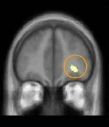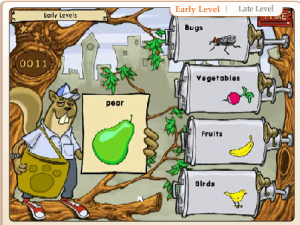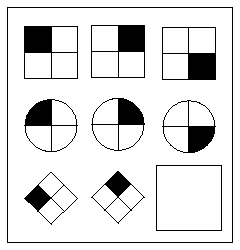Do ADHD Meds Make Healthy People Smarter?
Many of the emails I get about building a Next Brain have to do with drugs, especially medication prescribed for attention deficit hyperactivity disorder or ADHD. Readers want to know if there is evidence to support the claim that people without ADHD that still use drugs like Adderall will experience improved brain function and enhanced cognitive performance.
Important note: Using medications outside of the boundaries of their prescription or using medications without a prescription can be unsafe and illegal.
 The 2011 September issue of the Psychological Bulletin has taken this question up with articles on who takes so-called smart pills and what kind of effects they are having. My favorite paper,
The 2011 September issue of the Psychological Bulletin has taken this question up with articles on who takes so-called smart pills and what kind of effects they are having. My favorite paper,
reviews results from over 40 studies finds:
“The cognitive effects of stimulants on normal healthy people cannot yet be characterized definitively, despite the volume of research that has been carried out on these issues. Published evidence suggests that declarative memory can be improved by stimulants, with some evidence consistent with enhanced consolidation of memories. Effects on the executive functions of working memory and cognitive control are less reliable but have been found for at least some individuals on some tasks.”
In short there is some evidence for improved learning by memorizing (simple list of items) but doubt about significant improvement on working memory (how much information you can attend to at one) or self control.
More research is in the works but early results signal that the smart pill in its current form is not a silver bullet for the Next Brain.
Categories: College Student, Executive Function, Mental Focus Tags: smart drugs
Simple Rules Immediately Boost Math Brain
 Learning or relearning the basics of arithmetic – or how to add, subtract, multiply and divide numbers – is painful for most. With calculators everywhere some ask why even learn arithmetic?
Learning or relearning the basics of arithmetic – or how to add, subtract, multiply and divide numbers – is painful for most. With calculators everywhere some ask why even learn arithmetic?
Arithmetic is a core skill in a broader competency called numeracy or how we think quantitatively or with numbers. Quantitative literacy is important for success in a wide variety of careers and household projects, even if you use a calculator! Turns out that learning arithmetic (when done right) is excellent brain training and a foundation for quantitative literacy.
One key – see patterns in numbers using simple rules.
For example, can you complete 98 x 97 = ? in five seconds without a calculator? How about without paper and pencil?
This YouTube video will teach you how to do the problem and similar ones in just a few minutes. A snapshot is given below.
This is just one example of how a simple rule will immediately boost you math skills and build your brain. Of course you need to practice to get it to stick. There are many such rules and even some math programs for sale that teach them. The video above comes from Glad2Teach that also offers a similar approach to algebra. Another program that combines simple rules with memory building and fun is Brainetics.
Even if you already know arithmetic, such programs offer 10-15 minute daily exercises for training your math brain and building quantitative competency.
Very interested to hear from readers with experience using programs that teach simple rules for doing complex arithmetic problems by looking for patterns in numbers.
Categories: Child, Cognitive Development, Memory and Learning, Mental Focus, Training Tags:
Hard Evidence that Meditation Changes our Brains
 Mediation and mindfulness training is a frequent topic on the Next Brain Blog. Over the last several years we have seen studies that show a few weeks of meditation can produce measurable improvement in cognitive function and long-term practice actually makes certain brain regions larger. Now researchers at UCLA report in, Is Meditation the Push-Up for The Brain?:
Mediation and mindfulness training is a frequent topic on the Next Brain Blog. Over the last several years we have seen studies that show a few weeks of meditation can produce measurable improvement in cognitive function and long-term practice actually makes certain brain regions larger. Now researchers at UCLA report in, Is Meditation the Push-Up for The Brain?:
“… that people who meditate also have stronger connections between brain regions and show less age-related brain atrophy. Having stronger connections influences the ability to rapidly relay electrical signals in the brain. And significantly, these effects are evident throughout the entire brain, not just in specific areas.”
Changing the physical structure of the brain to preserve and enhance function and cognitive performance makes meditation a high-value training technique.
Interested to hear from readers that use any form of meditation. What technique do you use? How long have your practice? What Next Brain benefits do you see?
Categories: Cognitive Decline, Memory and Learning, Older Adult, Training Tags: meditation, mindfulness
Student Reading Skill Doubles in 24 Days
 Scientific learning just published the results of a controlled study on Fast ForWord Reading Level 1. This is brain training software designed to boost the abilities of early readers such as students in first and second grade. It build skills with phonemes (sounds) and images, vocabulary knowledge and decoding and sequencing skills and even motivation for reading.
Scientific learning just published the results of a controlled study on Fast ForWord Reading Level 1. This is brain training software designed to boost the abilities of early readers such as students in first and second grade. It build skills with phonemes (sounds) and images, vocabulary knowledge and decoding and sequencing skills and even motivation for reading.
In the study over 200 first and second graders trained 48 minutes per day for 24 school days. When tested against a control group they scored nearly twice as well.
An impressive result especially since it is focused on the fundamental skill of phonological awareness. This involves recognizing, taking apart, adding and moving sounds. It supports high performance in both reading and writing.
Interested to hear from others that use specific techniques to build reading skills in children.
Categories: Child, Perception, Software, Training Tags: speed reading
Mental Training at the Edge but Not Over
 One reason video games are addictive is that the difficulty of play is automatically adjusted by how well you do. If you are scoring low the game becomes easier by dropping you down a level. Likewise if game play is too easy, the level of difficult increases and you are faced with a greater challenge. By dynamically adjusting the difficultly of play, you are always operating at “the edge of your seat” (or ability) and experience a rich sense of challenge and accomplishment.
One reason video games are addictive is that the difficulty of play is automatically adjusted by how well you do. If you are scoring low the game becomes easier by dropping you down a level. Likewise if game play is too easy, the level of difficult increases and you are faced with a greater challenge. By dynamically adjusting the difficultly of play, you are always operating at “the edge of your seat” (or ability) and experience a rich sense of challenge and accomplishment.
It seems that the same effect can improve brain training at least in older adults. Research reported by the Beckman Institute for Advance Science and Technology found that older adults stay engaged when the intellectual demands of a task optimally match their abilities. Furthermore they found that completing such tasks produced cognitive benefits.
“Stine-Morrow said that engagement in activities that are neither too easy nor too difficult, but push at the boundaries of one’s skill level, produces the highly pleasurable experience known as flow and that the experience of flow may be an important pathway through which older adults can stave off the declines in fluid ability that sometimes accompany aging.”
Intellectually challenging tasks include for example taking a class or reading. The key is to pick the one that keeps you in the optimal balance between challenge and reward. While the research is focused on older adults I suspect the effect works well at all ages.
I am interested to hear from readers that are able to brain train at the edge but not over. How do you adjust the difficulty level?
Source of Image: The Edge
Categories: Cognitive Decline, Lifestyle, Older Adult, Training Tags: experiential learning
Toys Designed to Stimulate the Brain
 The most frequent question I get is from parents or parents to be. They want to know what they should do to develop their children’s brains and cognitive skills. Check out VTech toys (no affiliation). They are guided by a panel of experts and offer toys designed to stimulate learning and cognitive development at all ages from birth to 8 years. You can even search for products based upon your child’s age.
The most frequent question I get is from parents or parents to be. They want to know what they should do to develop their children’s brains and cognitive skills. Check out VTech toys (no affiliation). They are guided by a panel of experts and offer toys designed to stimulate learning and cognitive development at all ages from birth to 8 years. You can even search for products based upon your child’s age.
From baby’s learning laptop to the classic Peek-at-Me Bunny and the award winning sit-to-stand alphabet train (shown) each toy is designed to create a teachable moment that ranges from learning about body parts to mastering language. While the impact of specific toys might be unclear, the basic principles they are based on seem sound.
Very interested to hear from readers that have used brain building toys.
Music Lessons Offer Lifelong Cognitive Benefits
 Music is great for the brain in many ways. Learning to play a musical instrument is an excellent investment in improving brain function and cognitive performance. An interesting new study suggests that the brain boost we get from music lessons may last a lifetime. The study reported by the American Psychological Association examined the cognitive performance of adults (ages 60 t0 83) that studied music in childhood.
Music is great for the brain in many ways. Learning to play a musical instrument is an excellent investment in improving brain function and cognitive performance. An interesting new study suggests that the brain boost we get from music lessons may last a lifetime. The study reported by the American Psychological Association examined the cognitive performance of adults (ages 60 t0 83) that studied music in childhood.
“The high-level musicians who had studied the longest performed the best on the cognitive tests, followed by the low-level musicians and non-musicians, revealing a trend relating to years of musical practice. The high-level musicians had statistically significant higher scores than the non-musicians on cognitive tests relating to visuospatial memory, naming objects and cognitive flexibility, or the brain’s ability to adapt to new information.”
While these findings are tentative and require additional research, they do signal that musical training is a powerful tool for building your Next Brain.
Interested to hear from readers that were trained musically as children. How has that shaped your cognitive skills as an adult?
Categories: Child, IQ and EQ, Memory and Learning, Music and Audio, Older Adult, Perception, Problem Solving, Training Tags:
Art Forms as Cognitive Enhancers?
 There is growing scientific evidence that experiencing art both passively and actively can improve brain function and cognitive performance. Art is used as a form of cognitive therapy with older adults and art training is advocated for children by some experts:
There is growing scientific evidence that experiencing art both passively and actively can improve brain function and cognitive performance. Art is used as a form of cognitive therapy with older adults and art training is advocated for children by some experts:
Michael Posner argues that when children find an art form that sustains their interest, the subsequent strengthening of their brains’ attention networks can improve cognition more broadly.
Experiencing art means experiencing beauty which is powerful emotive and intellectual stuff. There are many anecdotal claims that it enhances mental energy, creativity, improves focus and relieves stress.
Some readers of the Next Brain Blog (including myself) have reported success with a very simple art-based technique.
- Find an a new art form that deeply resonates with you. Mine turned out to be the work of Juri Morioka (see sample above).
- Acquire legal, affordable and high quality copies.
- Consciously experience it on a daily or frequent basis.
It is important to find a new art form, not one you have always liked. Also you may need to change the specific pieces you experience periodically to maintain the intensity of the cognitive effects.
Interested to hear from readers that use this or other art-based techniques to enhance brain function and cognitive performance.
Image source: Paintings by Juri Morioka
Categories: Child, Cognitive Decline, Cognitive Development, Lifestyle, Mental Focus, Older Adult, Perception Tags: art
Does Thinking Out Loud Boost IQ and EQ?
 When working on a difficult problem or puzzle people will sometimes begin to mutter or even talk out loud. When trying to resist a tempting piece of chocolate cake or deal with an emotional issue we can coach ourselves with positive self talk that sometimes happens aloud.
When working on a difficult problem or puzzle people will sometimes begin to mutter or even talk out loud. When trying to resist a tempting piece of chocolate cake or deal with an emotional issue we can coach ourselves with positive self talk that sometimes happens aloud.
Can talking to yourself out loud make you a better problems solver or more emotionally intelligent?
Common practice says yes. Unfortunately, it is not very clear on when the technique might work. Plus there is no scientific evidence to back the idea up, until now.
Came across a unique study, How to Gain Eleven IQ Points in Ten Minutes, that found talking aloud can help in some circumstances. The key finding:
“… older adults performed significantly better only on the Raven’s Matrices while thinking aloud. Performance gains on this task were substantial (d = 0.73 and 0.92 in Experiments 1 and 2, respectively), corresponding to a fluid intelligence increase of nearly one standard deviation.”
Raven’s Matrices are used as a test for general or fluid intelligence. An example question is shown to the above.
Also of interest are the negative findings:
- No improvements were shown by younger adults
- Older adults did not show improvement on other cognitive tasks such as memory tests, perceptual tests, solving puzzles and so on.
More research is needed but the positive finding is so strong it is worth considering as part of your Next Brain development efforts.
Interested to hear from readers that use talk aloud strategies to improve brain function and cognitive performance.
Source of Image: Wikipedia
Categories: IQ and EQ, Lifestyle, Older Adult Tags:
Learning Self Control Early Drives Success
 Developing Your Next Brain, or making an effort to improve brain function and reach peak cognitive performance takes a lot of work. One reason we do it is to live a more successful life. While life success has many facets most agree that a cornerstone is self control. Being able to shape our own thinking and emotional responses, manage impulses, avoid self defeating assumptions and persistence in the face of obstacles is critical to living the good life. This has little to do with IQ and a lot to do with your ability to manage yourself.
Developing Your Next Brain, or making an effort to improve brain function and reach peak cognitive performance takes a lot of work. One reason we do it is to live a more successful life. While life success has many facets most agree that a cornerstone is self control. Being able to shape our own thinking and emotional responses, manage impulses, avoid self defeating assumptions and persistence in the face of obstacles is critical to living the good life. This has little to do with IQ and a lot to do with your ability to manage yourself.
There is considerable evidence to support this claim. Take for example, the recent research reported in Science News that suggests:
Good self management skills as early as age three predict health and wealth in adulthood.
The findings are dramatic:
“Low levels of conscientiousness, perseverance and other elements of self-control in youngsters as young as age 3 herald high rates of physical health problems, substance abuse, financial woes, criminal arrests and single parenthood by age 32, says an international team led by psychologists Terrie Moffitt and Avshalom Caspi of Duke University in Durham, N.C.”
How can children develop higher levels of self-control? Research from another group reported in the article claimed behavioral rewards, developing coping skills and role playing simulation using videotape are key. None of this is rocket science. For example, coping skills can include blowing bubbles and making funny faces. The rub is to learn to do these things rather than getting angry or stressed and yelling at others or giving up on a goal.
Very interested to hear from readers that have experience with specific techniques for improving self control and self management skills in children.
Categories: Child, Executive Function, Manage Emotions, Other, Training Tags: EQ, experiential learning


